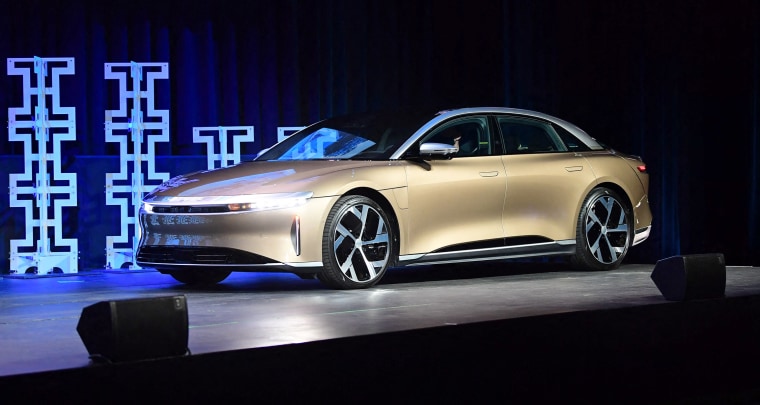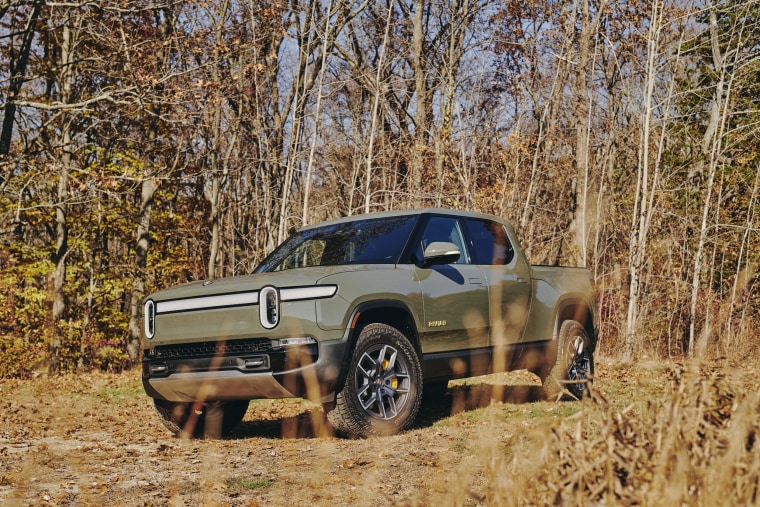The new Rivian R1T battery-electric pickup landed one of the auto industry’s most prestigious awards Monday when Motor Trend magazine named it Truck of the Year. Rivian beat out more established automakers, including Ford and Hyundai.
Taken alone, it’s a significant victory for Rivian, which has raised billions in capital from investors as diverse as Ford, Amazon and Cox Automotive. The R1T’s win comes barely a month after the influential magazine handed the trophy for Car of the Year to another EV startup, Lucid, and its new Air sedan.
And with both the Rivian R1T and the Lucid Air among the finalists in the North American Car and Truck of the Year awards to be announced a month from now, “what we’re seeing is a response to the changes in the industry,” said Stephanie Brinley, the principal automotive analyst for IHS Markit.
”This is a reflection of what the startups have been able to accomplish,” Brinley said, adding that it “is shaking up the industry."
A wave of new entrants hope to carve out space in an automotive market that hasn’t been kind to startups since the end of World War II. Brands like Fisker, Atlas, Byton, Canoo and Faraday Future hope to fare better than the likes of Bricklin, Kaiser-Frazer and Vector.

The key difference: The new manufacturers are focused exclusively on battery-electric vehicles. President Joe Biden aims to have EVs account for 40 percent to 50 percent of the U.S. market by 2030, and the new players are betting that they can carve out a profitable niche. And Tesla, which is getting ready to open up its fourth assembly plant, is their role model.
Rivian is seen as one of the companies most likely to succeed, thanks to strong backing from investors like Ford and Amazon, which ordered 100,000 all-electric delivery vans for its Prime service. The R1T, Rivian’s first entry into the retail market, bowled over the editors of Motor Trend.
“The Rivian R1T is a monumental achievement and astonishes with a quality of design, engineering, materials, and technology unmatched in trucks today, while providing a driving experience like that of a high-performance luxury car,” gushed Ed Loh, the magazine's head of editorial. “As the first all-electric pickup truck to market, the R1T manages to achieve all of this without offending historic truck-buyer sensibilities.”
The R1T rides on a skateboard-like platform, its batteries and motors mounted below the load floor. The layout allows for a roomy “frunk,” where gas-powered pickups mount internal combustion engines. Another large storage area is tucked below the cargo bed, ahead of the rear wheels. The pickup will come in a variety of configurations, starting with the $73,000 Launch Edition, loaded up with features from sophisticated wood and faux “leather” interior trim to a Level 2 driving assistance system.
Rivian founder and CEO RJ Scaringe responded to the Motor Trend news, tweeting, “Great work, team!”
The win puts the startup on the map, much as the Car of the Year trophy does for Lucid. Intended to compete with conventional premium luxury models like the iconic Mercedes-Benz S-Class, as well as the Tesla Model S, the Air sedan also made headlines when the Environmental Protection Agency estimated its range at up to 520 miles.
So far, Rivian and Lucid have delivered only a handful of retail vehicles. And even with all the awards, it’s far from certain they’ll duplicate Tesla’s success — never mind match legacy manufacturers like General Motors, Toyota and Volkswagen, said Sam Abuelsamid, the principal auto analyst for Guidehouse Insights.
“It’s definitely not business as usual," Abuelsamid said, adding that “it’s worthwhile honoring these [new] companies for what they’ve accomplished.”
“But there’s no guarantee they will succeed and thrive over the long term,” Abuelsamid said. “The established automakers have a flood of EV products coming. While they are late to the nascent market, that’s not necessarily a disadvantage.”
GM, for one, expects to be selling 30 battery-electric vehicles worldwide by 2030, Volkswagen about 50. The industry overall plans to invest over $500 billion in electric vehicles this decade. But it’s far from certain how the transition will fare, Abuelsamid and Brinley agreed. Although demand for all-electric models has more than doubled this year, battery-electric vehicles still account for barely 3 percent of the total U.S. market.
The added range, performance and features offered by products like the Lucid Air and the Rivian R1T should help, analysts suggested. But there are other challenges, including high costs. The Biden administration is pushing for increased federal tax credits for EV buyers — which could jump to $12,500 from $7,500 today — but the bill is struggling in Congress.
Biden did score a win with the passage of his $1.2 trillion infrastructure bill, however. The measure included funding to set up a nationwide network of 500,000 EV charging stations. The White House also Monday unveiled its “EV Charging Action Plan,” which seeks to “supercharge America’s efforts to lead the electric future.”
